Just days after her third concussion, award-winning journalist Eliza Reilly fainted in front of Fremantle coach Justin Longmuir. Six months on, she tells her life-changing, emotional battle with her brain.
“So how can I help you today?” The GP says as she closes the door behind her, not yet noticing the broken soul sitting in the chair opposite.
“Well I fainted at a Fremantle Dockers press conference yesterday a few days after suffering my third concussion in three years so I really just want to make sure that everything is okay,” I reply.
A few basic health checks came first. A request for bloods followed. I also pocketed a referral for a CAT scan of my brain and an echocardiogram to investigate a small heart murmur.
“I don’t think your fainting episode is linked with your latest concussion but let’s cover all bases just to be sure,” she said. “But before you go, I wanted to ask you, are you worried about your brain?”
I’d commended myself for holding back tears until this point. But her kindness sent me over the edge.
“Yes,” my voice wavered. “I really am.”
*****
There are not many worse sensations than slowly losing your grip on consciousness.
I fainted a few times as a kid, once memorably being caught by my year 5 music teacher as I tumbled from the top of a choir stand, so I know the signs.
First, your vision starts to blur around the edges. Then, your hearing starts to dissolve into echoes followed by static. Somewhere in between, your mouth starts filling with saliva.
I was preparing to ask Justin Longmuir a question about Neil Erasmus’ WAFL form at a routine, weekly press conference when the triple threats started to take hold.
Luckily I knew what was happening and was able to save myself by slowly sliding down the wall I was leaning against into a seated position. I don’t think I fully lost consciousness but my behaviour confused those also in the room.
My first thought was to grab my phone and start googling ‘fainting after concussion’ followed by a frantic text to Mum. One of my fellow journalists said he thought I was bashing out a breaking story.
As soon as Longmuir answered his final question and the cameras finished recording, my friend came running from the other side of the room.
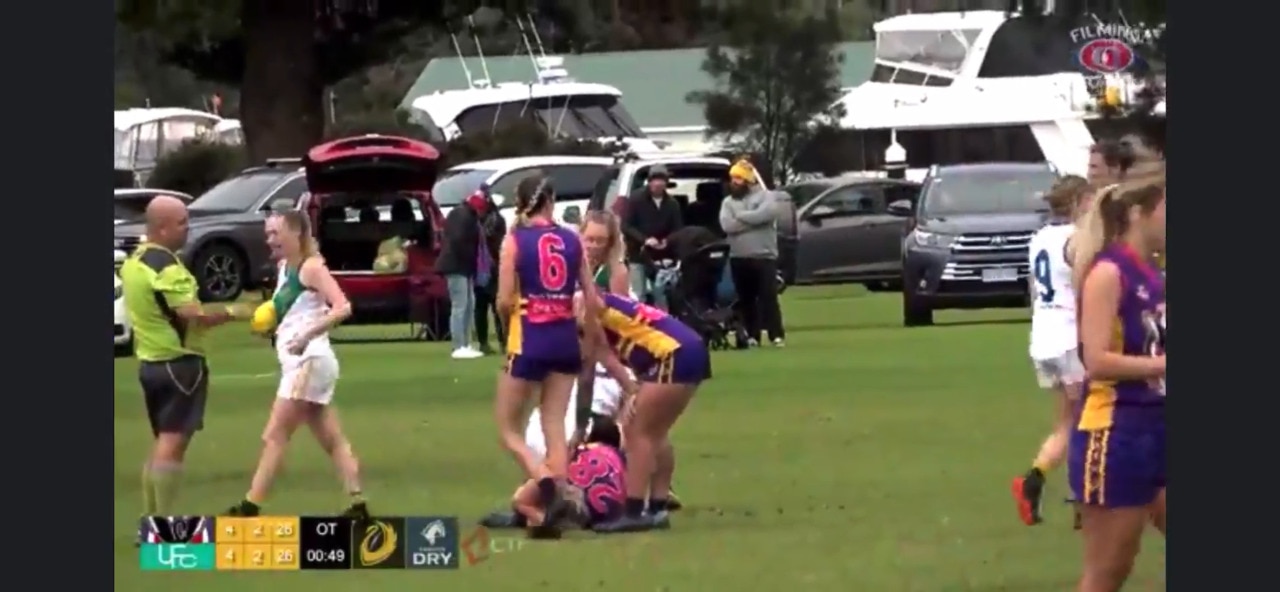
By that point, most had clicked on to what was happening, the ghastly shade of my face a decent clue.
I was brought water and a packet of confectionary snakes, stolen from the players’ kitchen. After a few minutes on the ground composing myself, I was able to make my way upstairs to watch training albeit clouded by brain fog. One of my journalistic colleagues was kind enough to drive me home after the ordeal.
Nearly 11 days had passed since my latest concussion.
The optimist in me had originally thought that it was the most minor of the three.
In truth, it was the worst.
It took two and a half months for me to feel human again.
More than six months on, I still live with the psychological scars of concussion and I’ve decided to give up football for good.
But even though it’s had a drastic impact on my life, I’m one of the lucky ones.
My symptoms have largely subsided. My life has returned to normal. I got to go out on my own terms, although for a while there it didn’t look like that would be the case.
The emotional toll of successive head traumas has been the hardest thing to heal. And my experience has taught me that even at the height of the Zeitgeist, we’re still not doing enough to combat concussion.
That’s why I want to share my story.
*****
To taper any expectations, I am the definition of amateur footballer.
Inspired by Harry Potter, my brother Billy likes to call me a muggle because I have no magic. No pack marks, no speed, no fend-offs, no line-breaking passes. I just sit in the back pocket and try to stop my direct opponent from scoring.
I like to think that every team has room for at least one muggle and that the structure would fall apart without them. And in 2022 as a member of the University Perth Football League A-Grade side, that spot belonged to me.
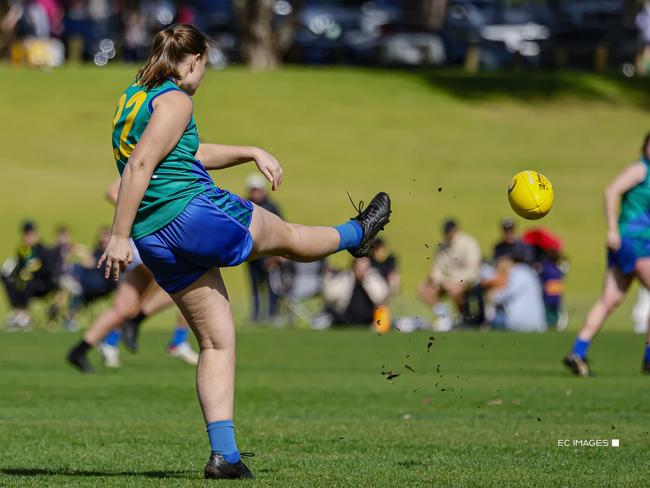
We won the last six games of the home and away season that year to finish third on the ladder. Warnbro beat us in a qualifying final but then we knocked off North Beach in a semi and reigning premiers Curtin in the prelim to book our grand final spot.
I’d been carrying a persistent hamstring strain since July and my car was also written when I was rear-ended in August so it had already been a challenging season. But if you’ve ever played in a team that’s made a grand final before, you can sense the momentum shift and I didn’t want to miss a second of it. Instead of thinking ‘why not us,’ you start believing ‘it will be us.’
So evenly matched were we and Warnbro that the grand final went into extra time not once but twice, both sides locked at 4.2 (26) after five periods of play. It was during the sixth that the Swans finally broke the deadlock. There are not many worse ways to lose a grand final.
By the time their star midfielder somehow broke two tackles and kicked the sealer from 35 metres out, I was sitting on the sidelines in a daze having been felled during the first period of extra time.
I’d never been concussed before. I’m glad it wasn’t ambiguous.
I was knocked unconscious. The last thing I remember was the ball slipping through my fingers as I went up for a mark. With the help of teammates, I’ve been able to piece together what happened next.
My wily Warnbro opponent, who had been chirping me all day, swooped on the loose footy and turned to hit up her full-forward. But before she could release her kick, I mustered my remaining stamina and tackled her.
I can only assume that I was worried about getting called for a push in the back so late in the game because instead of rolling her slightly, I ended up dragging her down on top of me.
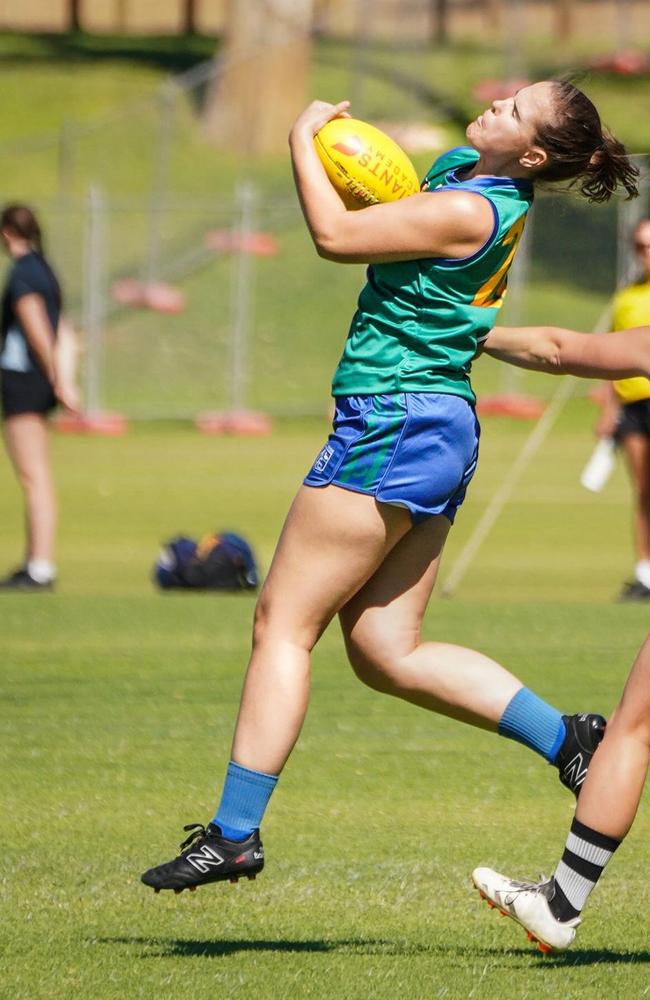
There were two points of impact – my head hitting the ground and either the back of hers or a stray elbow crashing into my forehead.
I was only out for a few seconds. Vision shows me trying to stand up and staggering backwards. They had to stop the game for several minutes because as well as doing a number on myself, I also injured my opponent’s ankle in the tackle.
Teammates on the bus back to the club afterwards told me that I’d saved the game, albeit momentarily. It mattered little when the final score read 5.2 (32) to 4.2 (26).
The team spent the night drowning their sorrows and watching Fremantle defeat the Western Bulldogs in a pulsating elimination final. I was supposed to be working that game but had successfully negotiated the evening off to commiserate or celebrate.
The cruel irony is that I wouldn’t have been able to work regardless. It wasn’t long before I rang my dad and asked for a lift home.
Luckily my recovery from that concussion was relatively straightforward. I felt pretty poorly for a few days afterwards as I dealt with headaches and light sensitivity but bounced back to normal within a week.
*****
The fact that my first concussion happened during the final game of the year meant that I had months to fully recover and by the time pre-season came around, enough time had passed that I missed football. It barely crossed my mind during the early stages of the year and the only time it resurfaced was in the week leading up to our grand final rematch against Warnbro.
We’d just about put Warnbro to bed in the third quarter when I collected a loose ball on the top of the 50 and was immediately tackled.
I was slung into the turf, the left side of my head bearing the force of the impact. Luckily I was conscious and aware but that same sensation washed over me. My teammates could tell too. One friend later described the fear in my eyes as the colour drained from my face.
I hobbled to the bench and was overcome by emotion as the pressure started to set in, a distinct humming on the left side of my cranium.
The way I described it to the physio was it was as if someone was slowly swirling a metal rod through the innards of my brain.
We won the game and my mates rigged the post-game raffle to try and cheer me up, handing me a recovery package at a local wellness centre. I did buy $100 worth of tickets and the money was going towards our new club rooms so while a little cheeky, I feel like morality could spare one prize.
I was able to drive home and while the headaches and light sensitivity were marginally worse than my first concussion, my most pressing concern was a flight to Europe I was supposed to be boarding four days later.
In an attempt to fast-track my recovery, I went to buy a Lego set to occupy me in the absence of screens. As I entered the carpark of the shopping centre, I drove over a speed bump and that slight jolt set my head off. Pain radiated through my jaw and temples and I had to sit in silence for the rest of the day.
The next day, I tried to go for a walk but every time I planted my foot, my head throbbed as if I’d just copped a half-wound hook. Stillness was the only cure for my symptoms.
After briefly considering delaying my flight, I started to steadily improve and departed a few days later for three weeks abroad.
I survived the rest of the season without incident but noticed that my mental clarity and form faded once I returned. I was making more mistakes within games and to my surprise, I was relieved when we got knocked out in the first week of the finals.
*****
Not long after, I was speaking with renowned concussion campaigner Peter Jess for a story I was working on. He was very generous with his time, telling me all about the latest concussion advancements and where the AFL needed to improve. But one thing he said stayed with me long after our conversation.
“The latest research coming from the northern hemisphere indicates that people who’ve had three or more concussions have been linked to worse brain function later in life,” was the genesis.
I was one head knock away from the point of no return.
I’d already committed to playing another season, stubbornly wanting to redeem myself. Lighting isn’t supposed to strike twice so there’s no chance it’ll land again I convinced myself.
As 2023 wound to a close, I was physically fine but I started to experience suffocating anxiety.
Excessive worry and intrusive thoughts weren’t new to me but they usually came in waves. At that point in my life, I literally had nothing to fear.
I was wrapping up a successful and rewarding year at work. A well-deserved holiday was just around the corner. And in mid-January, we were getting a toy cavoodle puppy. There was plenty to be excited about.
But I simply couldn’t shake the overwhelming sensation of anxiety.
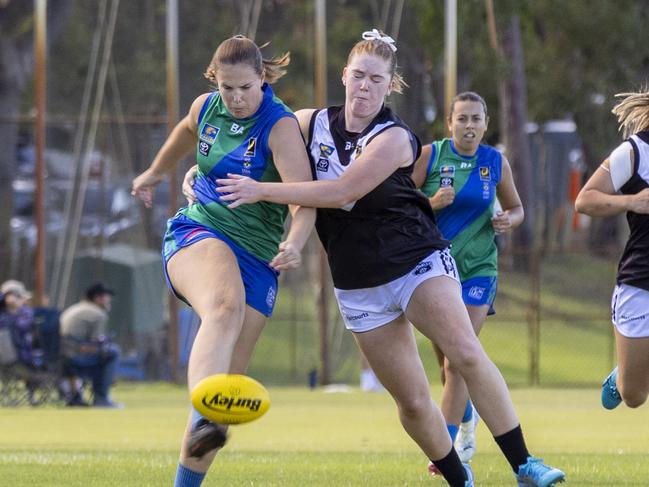
Every day, I woke up with a tight chest and crushing dread. One night I was lying in bed and started crying uncontrollably but I had no idea why. Anytime I made a misstep during a human interaction, be it as simple as briefly picking up the wrong coffee order in front of the rightful owner, my entire body recoiled and I spiralled for the rest of the day.
It took me finally seeing a medical professional to learn that I was in a constant state of fight or flight. My brain could not disconnect from the threat of danger and my parasympathetic nervous system had been operating at full bandwidth for weeks, if not months. And it all stemmed from concussion.
It took a couple of months and several appointments to convince my body that it was safe and that milestone coincided with the start of the season. I was genuinely excited about 2024 and felt fit and motivated.
I started the season off in A-Grade and the first three games of the season went by without incident. Then on May 4 against Rossmoyne, my 10 weeks of torment began.
I was genuinely playing one of the best games of my career which isn’t saying much but one of the assistant coaches backed me up on a night out later in the year when he told me he’d never seen me play better.
I was doing everything muggles aren’t qualified to do – taking intercept marks, selling candy, nailing girls holding the ball.
It was late in the last quarter when a teammate and I both tried to tackle the same opposition player. Instead of catching her, we crashed into each other.
I pulled up slightly sore and dazed. I remember the collision in its entirety but couldn’t recall any contact to my head. It felt more body on body.
The next day it became clear that I was more than just dazed. While it was only minor, I was fairly certain that I’d suffered another concussion, a delayed one this time.
The best way to describe it is I just felt a bit off. The feeling of pressure in my head returned and I wasn’t present.
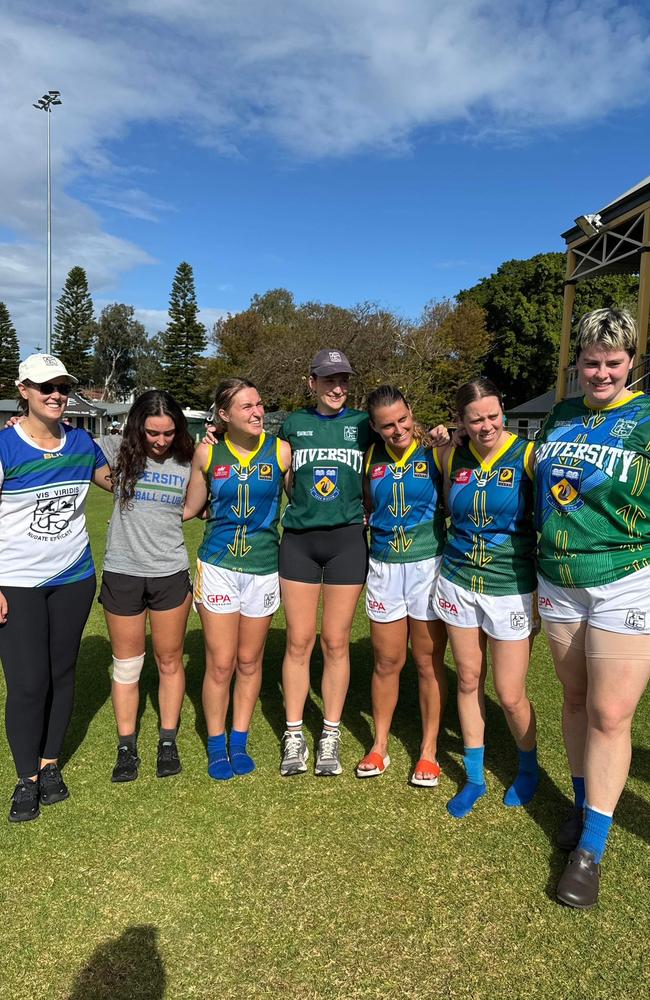
It initially felt quite trivial compared to the other two but I wanted to do the right thing by my body and treat it like a concussion.
I went to a physio on Monday and told them what I was feeling and asked to do a SCAT6 concussion test, explaining that I’d suffered two in the two years prior.
We did the test and much to my surprise I passed, largely because there was no baseline results to measure against. As a result, I wasn’t officially diagnosed with concussion and the advice was to see how I felt after training on Wednesday.
In all honesty, I was a little bit surprised given that the PFL cracked down on concussion last year and introduced new rules requiring players who suffered a head knock to miss two games.
Further research and conversations with mates in the medical field revealed that concussion is tough to diagnose given the variety and scale of symptoms.
It reached Wednesday, the day of main training, and I still felt off so I decided to rule myself out of our upcoming game.
By the following Monday, I had significantly improved. My symptoms had mostly gone and I was back in non-contact training. Two days later is when I fainted at work.
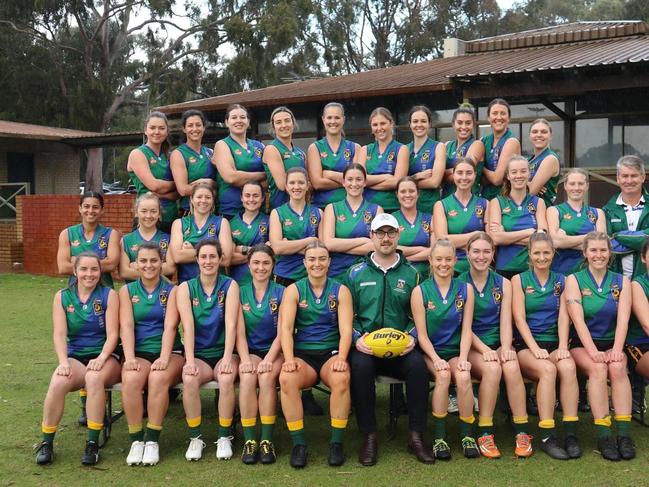
The cocktail of tests I was ordered to undergo all came back clear. After all of that, I was just a fainter.
But I noticed that my concussion symptoms had returned. They were worse than before but they refused to go away.
I felt zoned out and fatigued most days. I was forgetful, not a helpful trait for a journalist. I had spots in my vision. I suffered headaches but they were sporadic and weren’t connected to anything in particular.
I remember driving out to watch my teammates play one Saturday morning early in my recovery. I was so dizzy and nauseous that I had to put almost my entire body weight through my non-controlling foot to brace myself up against the headrest.
I missed two more games of football which turned into three weeks with a bye.
After a month on the sidelines, I felt ready to return.
My symptoms had subsided once again and I was training fully without fear. I put my hand up to play on Saturday, June 8 and was selected in the reserves team.
The night before the game, I was giddy with excitement. But when I arrived at the ground, I was swallowed by a tidal wave of fear.
I remember hiding in the toilets during the pre-game line meetings so I could try and control my tears. I pretended to retie my shoelaces at every quarter and halftime break so nobody would see my eyes welling up.
When I was out on the field, it actually felt like I was concussed again even though I was running away from the ball and the play at every opportunity. It felt like I was on another planet.
We were supposed to have a party that night to celebrate the midway point of the season but I couldn’t bring myself to go after crying the entire 15-minute drive home.
I couldn’t fathom how the sport I loved had become so foreign to me.
I thought I’d have to retire effective immediately and I was shattered that such an important decision to my being was about to be taken from me.
When people asked me who I was, I told them there were three pillars to my personality – football writer, football watcher and football player. Two didn’t seem enough of a foundation for a life lived in Aussie rules.
I took the next two weeks off playing and saw a concussion specialist who said it wasn’t unusual for symptoms to return when players returned to a game-like scenario.
There was a large psychological proponent to my relapse. I’d been through trauma and my brain simply didn’t have enough time to recover. There was also likely a cumulative effect in play which caused my symptoms to stick around.
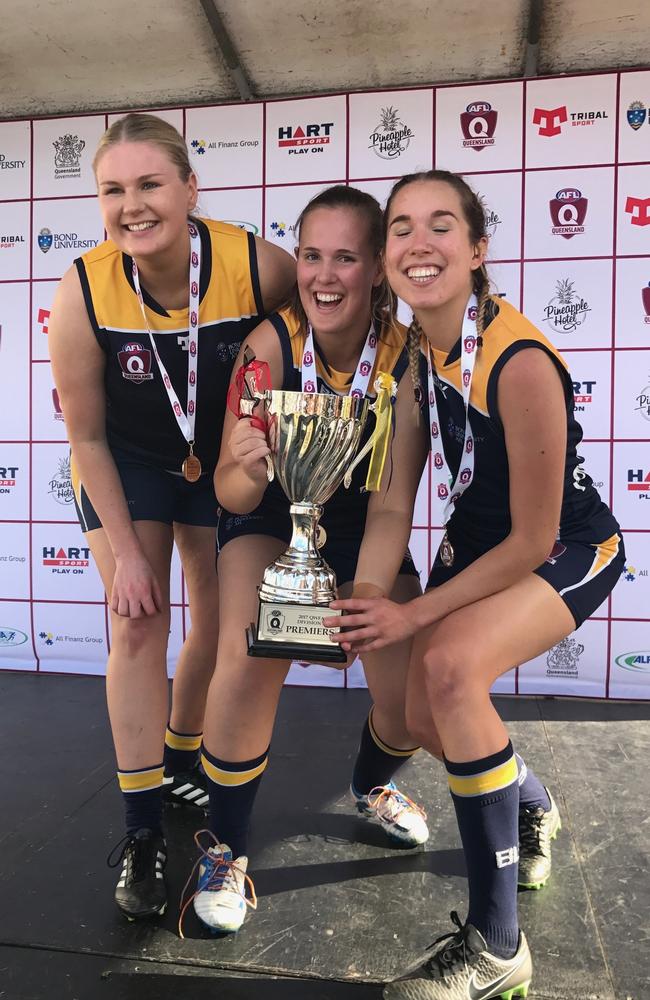
Up until that point, it felt like my entire concussion battle had been a case of choose your own adventure. It’s not like a hamstring strain you can scan or an ankle you can strap.
Nobody can tell you when you will feel better. Rehab is almost non-existent and there’s not much medical professionals can do to support you either. That’s what makes concussion so debilitating.
Every night I’d go to sleep and pray that I’d wake up feeling normal again the next day. But by that point, I couldn’t remember what normal felt like.
Two weeks off turned into four weeks with back-to-back byes for the school holidays.
Then finally on July 13, I made my return.
I was battling a pretty nasty cold at the time and was very out of breath but we won. And I finally felt like I could move on with my life thanks to the support of friends and family.
Coming out the other side has given me an appreciation of how sick I actually was.
For more than two months, I was worried that I’d never return to normal, that I’d never feel healthy again, and that I would just have to learn to live with my symptoms.
That fear has subsided and in its place now lives sincere gratitude that life goes on.
And after nine years, 110 games at four different clubs, one premiership with Bond University and two goals (have definitely been robbed of a few), it’s time for me to move on too.
I said I’d give myself up until the end of January to see if I had any appetite for one more season. But we’re now at that point and I am completely content with never playing again.
I’ve decided that my future is in coaching and I’ve been offered a role with the forward line for 2025. I’ve started training for a half-marathon to fill the void left by football. I’ve also signed up for our club committee to have an impact off-field.
Am I still worried about my brain? Yes, I am.
But I leave one chapter of my life behind knowing that I’ve done everything in my power to protect the next.
I got knocked out, but I got up again.

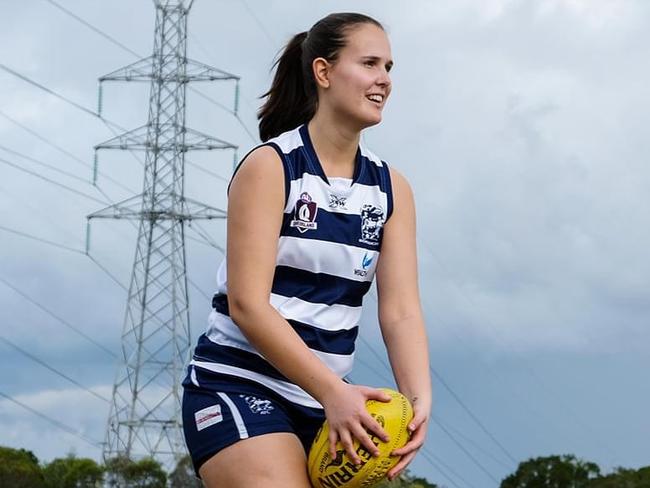
Add your comment to this story
To join the conversation, please log in. Don't have an account? Register
Join the conversation, you are commenting as Logout
World stunned by Aussie star’s outfit
As the golf world gears up for the Masters, fans couldn’t believe their eyes when an Aussie contender turned up in a seriously bold look.
Cricket prodigy’s next move revealed after tragic retirement
Following the sad early retirement of Australian cricket star Will Pucovski, the prodigious talent is set to make an immediate switch this summer.